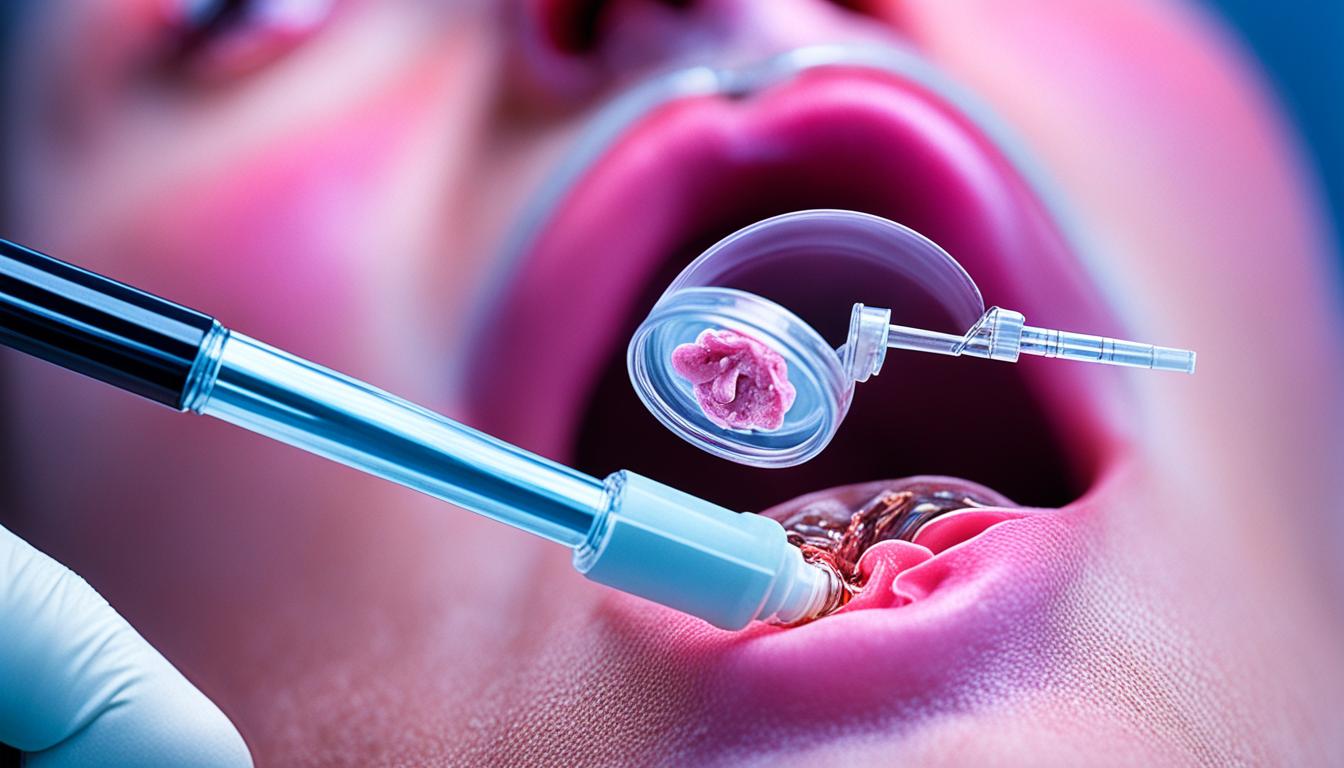Nasal polyps, known as nasal polyps or polyps in the nose, are soft non-cancerous growths. They appear in the nose or sinuses. These growths can be small or large and may show up in one or both nostrils.
They cause several issues like trouble breathing, a runny nose, and loss of smell. These problems can make life hard. They are more common in men and people with asthma, sinus issues, or allergies.
What leads to nasal polyps is still unclear. Yet, it seems they are due to regular swelling of the nose and sinuses. This ongoing swelling causes the fleshy growths to form over time.
Doctors diagnose nasal polyps by checking symptoms and doing a physical exam. To treat them, you might use steroids or other drugs. In worse cases, surgery may be needed to clear the polyps and help you breathe better.
Stem cell therapy is a new area in nasal polyp treatment research. Scientists are looking into whether stem cells can help by reducing swelling and healing the affected tissues.
Key Takeaways:
- Nasal polyps are non-cancerous fleshy swellings that develop in the lining of the nose and paranasal sinuses.
- Common symptoms of nasal polyps include breathing difficulties, a persistent runny nose, and a diminished sense of smell.
- Nasal polyps are more common in males and individuals with asthma, frequent sinus infections, and allergies.
- Diagnosis is usually made through symptom evaluation and examination by a doctor.
- Treatment options for nasal polyps include steroids, other medications, and surgery if necessary.
- Ongoing research is exploring the potential of stem cell therapy for nasal polyps.
Symptoms and Risk Factors of Nasal Polyps
It’s key to recognize the signs of nasal polyps for prompt treatment. Knowing what could lead to them helps cut the risk. This makes it easier to avoid getting nasal polyps.
Common Symptoms of Nasal Polyps
Nasal polyps show up with several clear signs. These signs are:
- Chronic runny nose
- Persistent nasal congestion
- Postnasal drip
- Loss of smell
- Poor sense of taste
- Facial pain
- Headache
- Snoring
- Itchiness around the eyes
- In severe cases, obstructive sleep apnea and double vision
Feeling any of these signs means it’s time to check with a doctor. Finding and treating nasal polyps early can stop problems and make life better.
Risk Factors for Nasal Polyps
Lots of things might raise the chance of getting nasal polyps. These can include:
- Sensitivity to aspirin
- Asthma
- Allergic fungal sinusitis
- Rhinitis/rhinosinusitis
- Cystic fibrosis
- Churg-Strauss syndrome
- Age
- Genetics
While these factors could make nasal polyps more likely, anyone can get them. So, watch out for signs and get help if you need it, no matter what your risk level is.
Complications of Nasal Polyps
Nasal polyps that aren’t treated can cause several problems, such as:
- Chronic sinus infections
- Obstructive sleep apnea
These problems can make life harder and need serious treatment. Getting help early for nasal polyps can stop these issues and lead to a better outcome.
Diagnosis and Treatment of Nasal Polyps
Finding nasal polyps usually means looking at symptoms and checking the nose. Sometimes we need other tests like nasal endoscopy and CT scans to see how severe they are. We also need to find any other health issues or blockages.
Dealing with nasal polyps depends on how bad they are and your specific case. Doctors often use steroids to lower swelling and make the polyps smaller. They might also suggest other drugs to treat the reasons for the swelling.
If the usual treatments don’t work or your polyps are big, you might need surgery. Operations like polypectomy or endoscopic sinus surgery can take out the polyps and make it easier to breathe. After surgery, using corticosteroid nasal sprays and doing saline rinses can help a lot. And making some life changes, like using a humidifier and being very clean, can also make a big difference. These steps can manage symptoms and lessen the chance of getting nasal polyps again.

